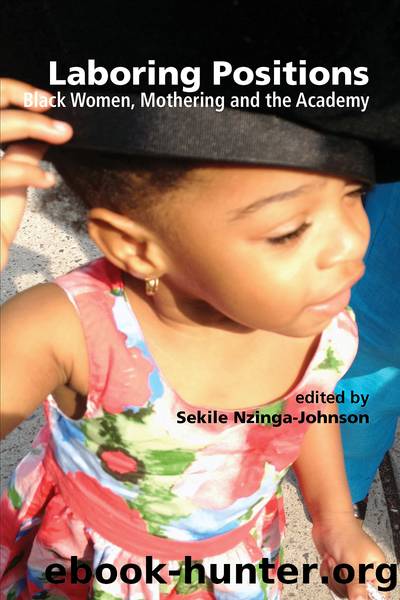Laboring Positions: Black Women, Mothering and the Academy by Nzinga-Johnson Sekile;

Author:Nzinga-Johnson, Sekile;
Language: eng
Format: epub
Publisher: Demeter Press
Published: 2014-08-15T00:00:00+00:00
8.
Walking Tightropes Without Nets
The Adjunct as Single Mother
STACIA L. BROWN
THINGS I WAS NOT TOLD
There is no glamour. Adjuncts are grunts. Pay according to âcredit hoursâ when rationed over twelve to fourteen weeks, is meager at best and well below the poverty line at worst. In order to earn a livable wage, one must work no fewer than 18 credit hours, which means teaching six three-credit classes per term. Typically, a college only lets an adjunct teach three courses per termâwhich means having to scramble for work within multiple college systems and quickly adapting to the circuitous rules, dates, deadlines, and expectations of each. An MFA, once considered âterminal,â is now a mere placeholder degree on the road to the newly minted Ph.D. in Creative Writing.
Gifted, disciplined, industrious creative writers may not need any degree at all to teach on the college levelâlet alone a masterâs degreeâand successful, published, critically acclaimed novelists need not even attend college to score a visiting professorship. Without significant publications, you will most certainly find yourself seeking a non-academic job within three yearsâ time.
You will work as hard as your full-time colleagues, but the respect conferred upon them via compensation for each of their outside-the-classroom tasks will elude you. Office hours, grading, course preparation, career counseling and impromptu confidante services are all unpaid duties of an adjunct faculty position.
It may have beenâand may still beâbetter for you to teach middle or high school English than College Composition or Basic Writing. And, because that middle or high school position is full-time with extensive medical, investment, and retirement benefits, people would respect you more for it. You would no longer have to field the question, âHave you ever considered being a real teacher?â
After a year or two of subsisting on saltines, canned soups, and dollar menu meals, while praying seven dollars of gas will get you to and from campus three more times before a weekâs end, you will ask yourself, âWhat is so great about pursuing a life of the mind? Why did I ever want this?â And then, as your stomach continues to growl, the follow-up question will come: âWhy do I want this still?â
Adjuncts can become invisible at whimâand this is not always a disadvantage, as it means we can avoid bureaucratic red tape and lengthy faculty meetings. Often, however, invisibility is disadvantageousâparticularly when we are in need of advocacy, either personal (as it relates to starting or growing a family) or professional (as it relates to being paid in accordance with our labor or receiving the medical benefits critical to ensuring that the stress of this precarious vocation does not doom us to an early grave).
If an adjunct becomes a mother, without having scrimped and saved to afford the countless expenses attendant to pregnancy and parenthood, she and her child will very likely experience prolonged situational poverty.
She will spend more time worrying about how to afford food for herself and her two-year-old daughter each summer than she will spend doing the writing, publishing, and panel-presenting that would better qualify her for a permanent teaching position.
Download
This site does not store any files on its server. We only index and link to content provided by other sites. Please contact the content providers to delete copyright contents if any and email us, we'll remove relevant links or contents immediately.
On the Front Line with the Women Who Fight Back by Stacey Dooley(4698)
The Lonely City by Olivia Laing(4571)
The Rules Do Not Apply by Ariel Levy(4526)
Bluets by Maggie Nelson(4263)
The Confidence Code by Katty Kay(4040)
Three Women by Lisa Taddeo(3281)
Inferior by Angela Saini(3152)
Not a Diet Book by James Smith(3152)
A Woman Makes a Plan by Maye Musk(3145)
Confessions of a Video Vixen by Karrine Steffans(3101)
Pledged by Alexandra Robbins(3049)
Wild Words from Wild Women by Stephens Autumn(2939)
Nice Girls Don't Get the Corner Office by Lois P. Frankel(2935)
Brave by Rose McGowan(2738)
Women & Power by Mary Beard(2618)
The Girl in the Spider's Web: A Lisbeth Salander novel, continuing Stieg Larsson's Millennium Series by Lagercrantz David(2614)
Why I Am Not a Feminist by Jessa Crispin(2585)
The Clitoral Truth: The Secret World at Your Fingertips by Rebecca Chalker(2585)
Women on Top by Nancy Friday(2449)
